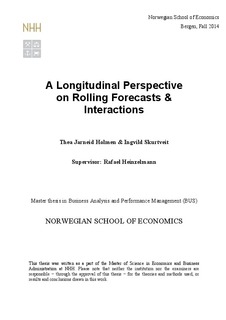A longitudinal perspective on rolling forecasts & interactions
Master thesis
Permanent lenke
http://hdl.handle.net/11250/277977Utgivelsesdato
2014Metadata
Vis full innførselSamlinger
- Master Thesis [4372]
Sammendrag
Increasingly complex and dynamic business environment has led to the introduction of
contemporary management control systems and management accounting innovations, such
as rolling forecasts that is an important tool in the Beyond Budgeting philosophy. This thesis
is a case study exploring the practice of rolling forecasts as a dynamic management tool
within an organization – namely FiGo. Through qualitative research method, the study aims
to get an in-depth understanding of how forecasting information, in a longitudinal
perspective, affects top management interaction. Specifically we investigate: (a) how top
management make use of forecasting information; (b) what changes has affected the
forecasting information and influenced top management discussions; and (c) what challenges
in regards of forecasting processes have affected top management attention.
Our main findings indicate that top management strives that rolling forecasts is used in the
whole organization, and that there is a consistently business understanding. Rolling forecasts
and the forecasting information is an important tool for knowledge sharing, learning, and
reflection at top management level. The study finds that there is a cultural change going on,
together with an anchoring of the Beyond Budgeting mindset, which has led to an increased
business understanding and more accurate forecasting information. However, the top
management faces a big challenge due to variation in the use of rolling forecast, and still
having “old budget mindset” in the organization, which increase the forecasting uncertainty
and decrease forecasting accuracy. The top management has a standardization agenda in
mind, trying to solve these problems, and manage to get comparable forecasting information
from the whole organization. The study finds that there is a decoupling and a tension
between how the top management wants the forecasts to be used, and what the operational
levels in the organization needs.
